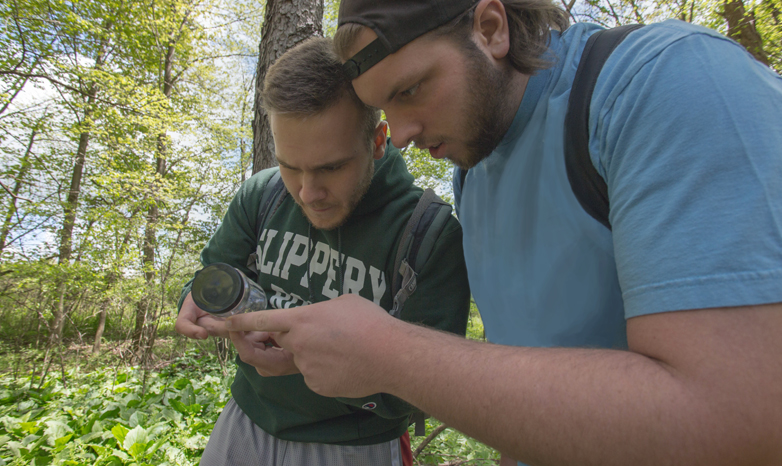A bug’s life captivates student researchers

(From left) Slippery Rock University biology majors Jacob Bile of Cranberry and Justin McGinnis of Dilltown examine insect specimens captured during a recent field entomology class at Pymatuning State Park.
May 19, 2016
SLIPPERY ROCK, Pa. - Spiders, beetles, scorpion flies, butterflies and wasps were among the specimens Slippery Rock University students began collecting on campus this week as part of their "Field Entomology" class.
The class is an insect study consortium that includes two students from SRU, seven from Pitt and two from Clarion University. Students began the field studies phase of the class Wednesday in the woods abutting the Ski Lodge.
Hoop nets in tow, the student researchers collected creatures that bite and buzz and placed them into jars so they can study their body structure and behavior back in the lab.

LAYNE
For the rest of the week, under the direction Jack Layne, SRU professor of biology, who teaches the class, students will gather and identify insects from Pymatuning State Park.
"It is a training project rather than a effort to generate publishable data," he said.
Insects have segmented bodies and at least three pairs of legs. Most have large, bulbous eyes. Although insects scare some people, they don't bug Jacob Bible of Cranberry and Justin McGinnis of Dilltown, the two SRU biology majors who enrolled in the course. They were hoping to capture a hornet Wednesday and ended up with moths, beetles, a wasp and ants.
"There is an incredible amount of value in this. You don't see a lot of classes in entomology," Bible said. "You can always find new bugs. They are all over the place. You can never get away from them."
Bible said some people collect insects as a hobby and others make money off them, such as beekeepers and pest controllers.
The group of students hiked through the woods swooshing their hoop nets through the tall grass. A Pitt student captured a "daddy long legs" spider and allowed it to walk on his index finger as he talked about the spider's spiny legs. Students wore long pants and toed shoes to guard against ticks and sprayed insect repellent on their skin.
McGinnis said despite their ability to sting, honeybees provide a valuable contribution to ecosystems by pollinating plants. "Honey bees are one of the most important organisms on earth," he said.
McGinnis said he's excited to cover topics such as the physiological ecology of insects.
"Not many people find insects interesting, but they are so important to everyday life that they deserve to be studied. I find insects really interesting and that makes learning this information that much more valuable to me. I find insects interesting because there is so much variability in them. Depending on different factors like habitat and weather, the insect will adapt to survive."
Layne said the course is an overview of the biology of insects and includes topics about their body structure and function, ecology, behavior and identification. Students do a group project surveying the effects of habitat disruption on insect diversity in forested areas.
The insect world, although small in physical stature, rules the world in population. It is estimated there are more than 900,000 different kinds of insects, according to the Encyclopedia Smithsonian. The Smithsonian estimates there are more than 10 quintillion (10,000,000,000,000,000,000) individual insects alive on the planet.
MEDIA CONTACT: Gordon Ovenshine | 724.738.4854 | gordon.ovenshine@sru.edu

